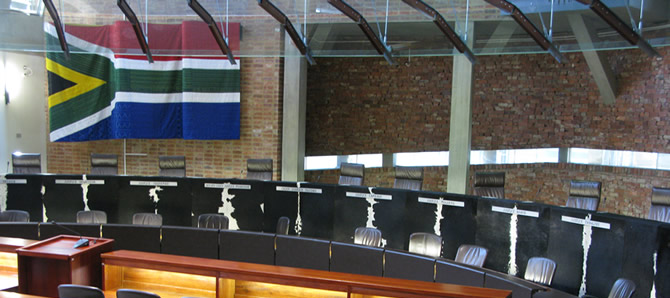Power: It defended the separation of powers and asserted that no person was above the constitution
By Monk Nkomo
The Constitutional Court was born of struggle and hope – anchored in the belief that never again shall South Africa be governed without regard for dignity, equality and justice for all the people who lived in it.
This was said by President Cyril Ramaphosa in his keynote address at the 30 year anniversary celebration of the Constitutional Court in Braamfontein, Johannesburg.
The occasion was graced mainly by Chief Justices and Judges from here and abroad as well South Africa’s former Presidents, Thabo Mbeki and Kgalema Motlanthe.
The establishment of the Constitutional Court, Ramaphosa said, lent legitimacy to the new order at a time when Black people were emerging from decades of oppression. When the court was established 30 years ago in a newly democratic South Africa, it was a bold institutional response to a history that had denied the majority of South Africans their basic human rights. It was tasked with interpreting and safeguarding the rights enshrined in the Constitution of 1996.
‘’ The court was established on the ruins of an oppressive legal system and was built on the grounds of a former prison, embodying the hope that law could become an instrument of justice rather than repression’’.
Constitutional Court Judges were appointed at a time of great complexities in the life of the South African nation and navigating the imperative of societal transformation back then, was certainly extremely difficult. And yet the court, since its inception, set the tone for humanistic jurisprudence that continued to endure.
Ramaphosa said as the country celebrated the 30 years of the court’s existence as a living symbol of not only justice but transformation, the journey it travelled had been a long one.
‘’ And yet amidst all these, the Constitutional Court has not been shaken but stood firm as a credit to the democratic order. What has defined the court that we are proud of, is not just the wisdom of its judgments but the courage of its convictions.
‘’ It has withstood political pressure, defended the separation of powers and asserted that no person or institution is above the Constitution. It has done so with a steady voice, grounded in reason, compassion and principle.’’
The court had at times found itself dragged into political controversies and has had to manage occasional frictions with the executive over the separation of powers.
In the early years since democracy and well beyond, the court had contributed not just judicial validation of the constitutional order. It had elevated the consciousness of the people about their constitutional rights. It had contributed to building trust in the judicial system.
‘’ Through principled constitutional interpretation, it has contributed greatly towards advancing national cohesion and reconciliation. This objective of national cohesion and reconciliation has been executed by the court. Through its divisions, it has ensured that all are treated fairly and equally under the law – thus affirming the legitimacy of the legal order and promoting a sense of belonging among all citizens’’, said Ramaphosa.
The court, he added, had demonstrated its capacity to interpret the Constitution in response to the lived realities of the people. It has, and continued to do so without fear or favour and remained a bulwark of justice and hope.
The court had developed a rich and transformative jurisprudence . Their judgments were not merely legal decisions – they were decisions that had changed lives, shaped the society and strengthened the country’s democracy.
The court, said the President, carried an extraordinary mandate and a weighty responsibility. Yet it had always risen to the moment. Its role was always more than legal. It was deeply symbolic . It was a noble symbol of the country’s democratic order – both immortal and legal compass.
The promise of the Constitution however, was far from fully realised. Persistent inequality threats to judicial independence, lack of implementation of court orders and erosion of trust in institutions, remained pressing challenges.
‘’ We must acknowledge the troubling irony of lauding the Constitutional Court’s progressive judgments on one hand especially on socio-economic rights, with the reality that the State apparatus has in many of these cases, had to be compelled by this very court to fulfil its obligations.’’
Ramaphosa said this pointed to widespread and systematic shortcomings in service delivery that must be addressed. South Africans should not have to resort to litigation to have their rights realised and this was the paramount consideration.
This moment, he added, called not only for the 30 year celebration, but also for reflection, for recommitment and for a renewed vision of constitutionalism in action in South Africa. The success of the court had been achieved through the collective effort of many and was the product of a judicial legal ecosystem.
To ensure that the judiciary executed their duties independently, effectively and with dignity, government pledged to provide a range of institutional infrastructure, financial, administrative and legal support. The support was crucial to maintaining judicial independence which was a cornerstone of democracy and the rule of law.


































